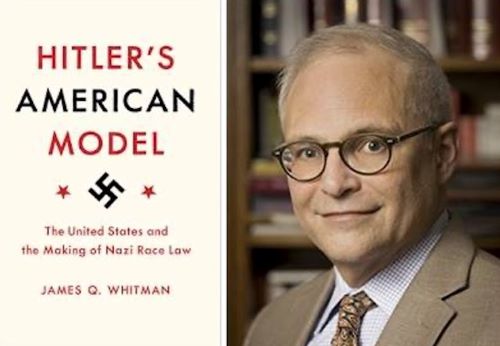How the US influenced the creation of Nazi race laws under Hitler

Adolf Hitler raises a defiant, clenched fist during a speech. Photo from Getty Images.
Adolf Hitler and his Nazi followers in the 1930s fashioned race laws that were designed to degrade and deprive Jewish people of all rights. At the same time, American laws often enshrined white supremacy and discriminated against non-whites, and Black Americans in particular were treated as second-class citizens.
Prompted by Hitler’s own words in his hateful screed Mein Kampf, celebrated Yale professor of law and history James Q. Whitman conducted meticulous research to determine the influence of American sources on Nazi jurists and scholars in the early years of Hitler’s reich. In in his groundbreaking and disquieting 2017 book Hitler’s American Model: The United States and the Making of Nazi Race Law (Princeton University Press), Whitman found that the Nazis had carefully studied American racial law and social policies in developing Germany’s antisemitic Nuremberg Laws of 1935 and other policies.
As Whitman reveals, Hitler saw the United States as the world leader in establishing a racist social order. Hitler and Nazi lawyers admired racist U.S. immigration laws; criminal laws forbidding mixed marriages or sexual relations; and Jim Crow segregation laws and other provisions that robbed African Americans of rights. And they especially admired the mass extermination of Native Americans by “Nordic” pioneers.
Here are some highlights from an in-depth interview with Whitman, the Ford Foundation Professor of Comparative and Foreign Law at Yale Law School, that appeared on the History News Network.
The origins of Hitler’s American Model
I was interested in … the hierarchical ordering of human societies. … In the 20th century it seemed natural to compare two examples, namely Jim Crow laws in the United States and Nazi race law of Nazi Germany. … Honestly, I didn’t think that I would discover … that Nazis had actually taken not just interest in American law, but a kind of active, studious interest in American law with a desire to learn from what the Americans had done. In Mein Kampf, Hitler says that only one country has made even tentative progress for the creation of a healthy race order and, of course, that’s “the United States of North America,” as he put it.
 James Q. Whitman is the author of Hitler’s American Model: The United States and the Making of Nazi Race Law.
James Q. Whitman is the author of Hitler’s American Model: The United States and the Making of Nazi Race Law.
Hitler believed that the U.S. saw itself as ‘a Nordic German country’
Many Americans also did. Although, all of this is but one side, the nightmare side of the American story, and the Nazis were aware of that too. They were often puzzled by the competing currents in American political lives, some of which looked very much like the Nazi currents that they owed allegiance to, and some of which looked entirely incompatible with Nazi ideals.
American infatuation with eugenics influenced the Nazis
Race law is not just about eugenics, but it’s also about creating social hierarchies and humiliating people and developing notions of second-class citizen status and all those sorts of things. But what made the United States such an interesting model to a regime like the Nazi regime was that the Americans were really unembarrassedly interested in passing laws on these topics and spent a lot of time developing legal doctrines that could be used not only to the ends of creating a eugenically healthy population … but also to develop hierarchical laws.
And there’s the famous line from Supreme Court Justice Oliver Wendell Holmes: “three generations of imbeciles are enough” … from the Supreme Court [Buck v. Bell (1927)] in a case upholding a sterilization law. It’s important to emphasize, even though everything about American eugenics looks pretty ugly to me, that doesn’t mean that we got as ugly as the Nazis did with regard to extermination. When we read what Hitler had to say in particular, and other Nazis, the model for extermination policies in Eastern Europe didn’t have to do with eugenics as such. It had to do with the American conquest of the West in particular.
Hitler admired the mass extermination of millions of Native Americans
He did indeed. And, of course, the U.S. looked like a model for a German like Hitler because … Germany should be spreading east in the way the Americans spread west, and they should be at a minimum, displacing and possibly eliminating the local populations, as they did it.
If I may emphasize it, [the Native American genocide] was a more attractive model … [than the Armenian genocide] to the extent that the U.S. had made itself the dominant superpower in the world, and that’s what Hitler wanted for Germany as well. Being a Nazi, like other Nazis, and like other hard right-wingers, in trying to explain America’s tremendous geopolitical success, Hitler ascribed it naturally to American racism.
United States leadership in racist immigration laws
The laws in the early 20th century in particular were Hitler’s special focus in Mein Kampf. These were not expressly racist. … Instead, the laws introduced national quotas. There were earlier laws that directly and expressly targeted Asian immigrants. But these 20th century laws created national quotas with the open intent of keeping out the wrong kind of people—those who didn’t fit the Nordic ideal.
Nazis focused on Jim Crow laws and second-class citizenship
I must emphasize one thing that’s important to note is that the Nazis were not only interested in Jim Crow laws, but … the entire suite of American race practices. Some American laws targeted Asians, and some of them, of course, targeted Native Americans, and there was a whole lot there.
But with regard to second-class citizenship, the Americans faced the problem that the 14th amendment makes it clear that you can’t deprive someone of citizenship and, as a result, the American creation of the second-class citizenship of the kind where you’re depriving someone of voting rights and the like had to be done through subterfuges. And it was done very effectively through subterfuges, but the Nazis didn’t feel the need for subterfuges themselves. [They] were entirely open about the creation of second-class citizenship for Jews especially.
Nazis admired American laws criminalizing miscegenation
It’s astounding. And those laws were expressly racist and directly served as inspirations for Nazi legislation. And we know this in particular because of one of the most telling bits of archival evidence I found was the transcript of a meeting in the summer of 1934 in which the Nazis discussed what sort of criminal law they should create in order to bring the new Nazi order into existence. And there, they specifically studied American laws and particularly American anti-miscegenation laws. The desire of the most radical Nazi was to criminalize mixed marriage, and America offered not only a model but pretty much the only model in the world for doing that, and some of the penalties were extraordinarily tough.
The Nazis found U.S. law on race and Black people sometimes too harsh
That was a shocking discovery on my part. Some states, not by any means all, defined any person as Black if that person had even one drop of Black blood, which meant looking to any Black ancestor at all, however far back, who was Black. Other states had less far-reaching definitions, such as having one Black grandparent or something like that, but every single American definition went beyond what the Nazis themselves ever embraced. When Nazis discussed the far-reaching notorious American one-drop rule, they said things that you would never imagine hearing from a Nazi, such as, “That’s completely inhumane. How could you do that?”
Prosecution of racially mixed couples in the United States
The critical issue was not whether they’d be exposed to criminal prosecution, but whether they could form a valid marriage at all. In most cases, that was much more the live issue. They couldn’t find officials who would perform the marriage and any prohibited marriage would not be regarded as valid, so none of the rights and duties that follow from having a valid marriage would apply in their case. It was deeply inconsistent with respecting family autonomy, as the Supreme Court understood in the Loving v. Virginia decision. [And that] constitutional basis for respecting privacy and autonomy was rejected in the Dobbs decision about abortion.
On U.S. democracy and ongoing racism, antisemitism and xenophobia
In my view, we must recognize what happened in Germany and understand how intriguing Germans found the American example as ways of reminding us of the basic, really terrifying truth that it can happen here. … And, one hope is that there are foundations to American liberal culture that are ultimately unshakeable. … I wouldn’t claim to predict the future, but the history certainly can bring home to us the full and uncomfortable range of possibilities in making a human society.
Robin Lindley is a Seattle-based attorney, writer and features editor for the History News Network. His work also has appeared in numerous publications. Lindley can be emailed at [email protected].



